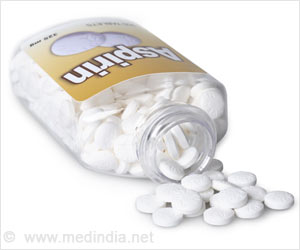- Patients given clopidogrel along with aspirin after experiencing either a transient ischemic attack (TIA) or a minor stroke show a lowered risk of getting a major stroke within ninety days after the first incident
- Bleeding episodes, mostly gastrointestinal occurred in a small percentage of the patients but were reversible and none fatal
- Overall benefits of preventing a major disabling stroke are far greater with the drug combination, says study
After suffering a minor stroke or a TIA, a person has a 3 to 15 percent chance of having a more severe stroke within the next three months. The minor stroke and TIA patients are usually given aspirin (50–325 mg/d) after the attacks.
Even with treatment of aspirin, the short-term risk of a major stroke is high particularly in the first few days after the first stroke.
Clopidogrel is a platelet inhibitor or an antiplatelet drug that is commonly prescribed to people who have peripheral artery disease or who have had a recent heart attack or stroke to prevent such events from recurring. Clopidogrel has advantages in being oral, inexpensive in a trial and without major side effects other than hemorrhage.
Previous trials have already shown that clopidogrel plus aspirin was effective in lowering risks but the risk of hemorrhage in the trials was high or not calculated.
No large-scale trial has evaluated an acute intervention of antiplatelet therapy in the patients after TIA and that is what the current study aimed to do.
Study - Platelet-Oriented Inhibition in New TIA and minor ischemic stroke (POINT) trial
The POINT trial was a randomized, double-blind, placebo-controlled trial conducted between May 2010 and December 2017. It was a multicenter clinical trial that comprised of 4,881 patients and included patient information from 269 sites in 10 countries throughout North America, Europe and Australia.The patients who had a minor stroke or a transient ischemic stroke and who were at high risk of having a major stroke could enroll in the trial.
The aim of the trial was to determine the safety and effectiveness of the combination of low-dose aspirin andclopidogrel in reducing the risk of stroke, heart attacks and other complications among the enrolled patients.
The patients were given clopidogrel 75mg/day (after a loading dose of 600mg) that was initiated within 12 hours time last known free of new ischemic symptoms of TIA or minor ischemic stroke in subjects who were already receiving aspirin 50-325mg/day.
The researchers studied if the combination of the two drugs was effective in improving survival free from major ischemic vascular events (ischemic stroke, myocardial infarction, and ischemic vascular death) at 90 days from the start of administering clopidogrel.
Results of the Trial
Adults who took clopidogrel plus aspirin after undergoing a minor stroke or TIA had a 25 percent lower risk of a major stroke, heart attack or death from blood clots within three months after the attack, compared with those who took aspirin alone.However, there was a small increase in the risk of hemorrhage in the clopidogrel-aspirin group compared with the aspirin alone group.
Thirty-three hemorrhages occurred among the 4,881 patients out of which
- More than half of the hemorrhages were in the gastrointestinal tract and reversible
- None of them were fatal
Also, since the bleeding events are mostly preventable or treatable, the overall benefit of avoiding disabling strokes by the drug combination outweighs the risk for most patients.
The risk of thrombosis is extremely high in the acute period after TIA while the risk of hemorrhage is lower than after a complete stroke; using the drug combination may be particularly effective and relatively safe in this setting.
"The results of this large international trial, when added to the results of previous research, provide evidence to support the use of clopidogrel plus aspirin for 90 days among patients with minor ischemic stroke and high-risk TIA treated within 12 hours," said Ralph Sacco, M.D., M.S., professor of neurology at Miller School of Medicine at the University of Miami. "This trial is likely to change practice since most clinicians and patients are usually willing to accept the increased risk of hemorrhage to offset the disabling impact of a stroke."
"It's likely we will see more patients who have had a TIA or a minor stroke receiving the combination of clopidogrel and aspirin in the future," Johnston said.
Transient ischemic attack (TIA) and minor ischemic stroke
During a TIA the person experiences stroke-like symptoms like sudden weakness on one side of the body or trouble speaking that only lasts temporarily. It is caused when a blood vessel to the brain is temporarily blocked; the block often dissolves or dislodges on its own to stop symptoms.There is an estimated 250,000-350,000 TIAs that occur each year in the US.
A minor ischemic stroke is defined as interruption of blood flow to a certain part of the brain. It results in mild, disabling symptoms.
There is rapid recovery of cerebral ischemia (loss of blood supply) in TIA and minor ischemic strokes, a feature that distinguishes it from a complete stroke. However, the recovery indicates that there is a previously ischemic tissue that is still at risk.
The outcome of both minor ischemic stroke and TIA are the same and both groups are at high short-term risk for a new ischemic stroke.
References:
- Stroke prevention drug combo shows promise, study says - (https://www.eurekalert.org/emb_releases/2018-05/uota-spd051418.php)
- Platelet-Oriented Inhibition in New TIA and minor ischemic stroke (POINT) Trial - (http://www.pointtrial.org/)
Source-Medindia















